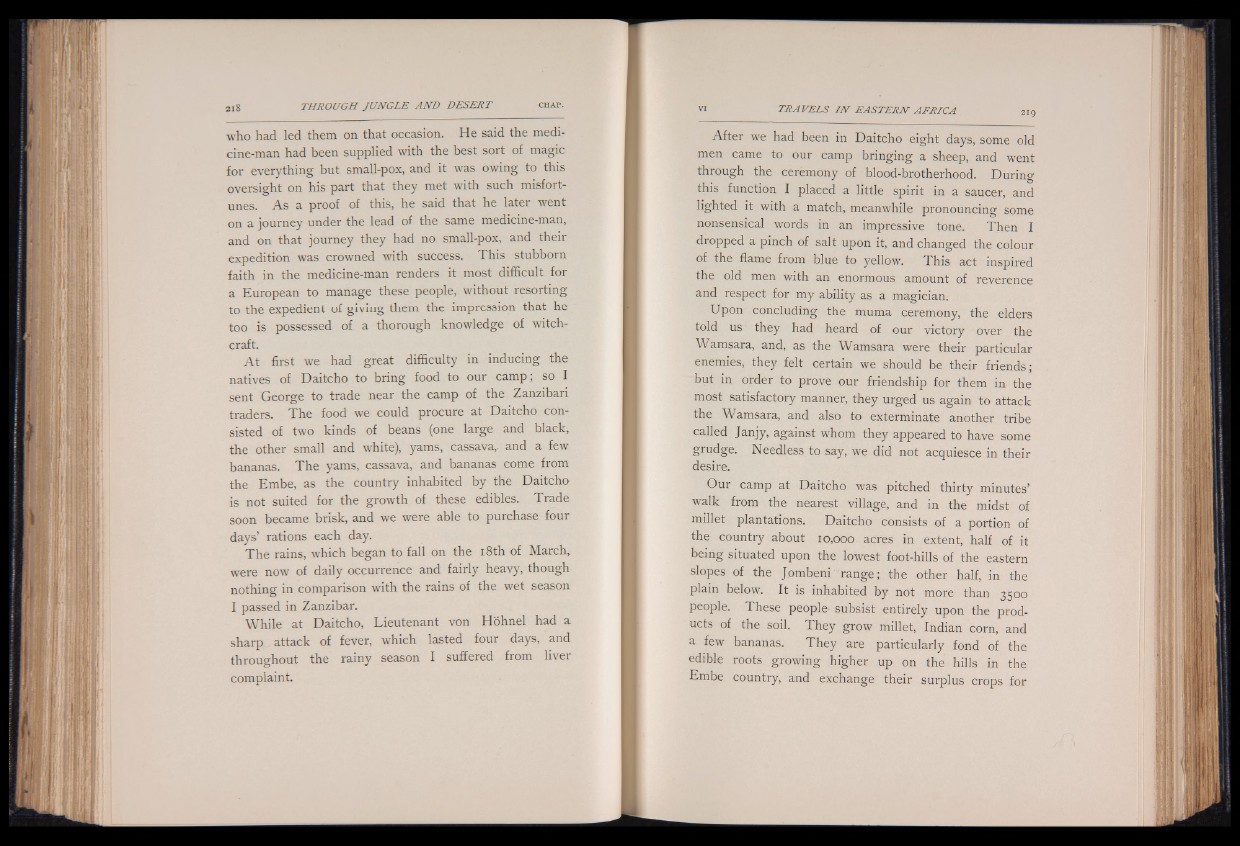
who had led them on that occasion. He said the medi-
cine-man had been supplied with the best sort of magic
for everything but small-pox, and it was owing to this
oversight on his part that they met with such misfortunes.
As a proof of this, he said that he later went
on a journey under the lead of the same medicine-man,
and on that journey they had no small-pox, and their
expedition was crowned with success. This stubborn
faith in the medicine-man renders it most difficult for
a European to manage these people, without resorting
to the expedient of giving them the impression that he
too is possessed of a thorough knowledge of witchcraft.
A t first we had great difficulty in inducing the
natives of Daitcho to bring food to our camp; so I
sent George to trade near the camp of the Zanzibari
traders. The food we could procure at Daitcho consisted
of two kinds of beans (one large and black,
the other small and white), yams, cassava, and a few
bananas. The yams, cassava, and bananas come from
the Embe, as the country inhabited by the Daitcho
is not suited for the growth of these edibles. Trade
soon became brisk, and we were able to purchase four
days’ rations each day.
The rains, which began to fall on the 18th of March,
were now of daily occurrence and fairly heavy, though
nothing in comparison with the rains of the wet season
I passed in Zanzibar.
While at Daitcho, Lieutenant von Hohnel had a
sharp attack of fever, which lasted four days, and
throughout the rainy season I suffered from liver
complaint.
After we had been in Daitcho eight days, some old
men came to our camp bringing a sheep, and went
through the ceremony of blood-brotherhood. During
this function I placed a little spirit in a saucer, and
lighted it with a match, meanwhile pronouncing some
nonsensical words in an impressive tone. Then I
dropped a pinch of salt upon it, and changed the colour
of the flame from blue to yellow. This act inspired
the old men with an enormous amount of reverence
and respect for my ability as a magician.
Upon concluding the muma ceremony, the elders
told us they had heard of our victory over the
Wamsara, and, as the Wamsara were their particular
enemies, they felt certain we should be their friends;
but in order to prove our friendship for them in the
most satisfactory manner, they urged us again to attack
the Wamsara, and also to exterminate another tribe
called Janjy, against whom they appeared to have some
grudge. Needless to say, we did not acquiesce in their
desire.
Our camp at Daitcho was pitched thirty minutes’
walk from the nearest village, and in the midst of
millet plantations. Daitcho consists of a portion of
the country about 10,000 acres in extent, half of it
being situated upon the lowest foot-hills of the eastern
slopes of the Jombeni range; the other half, in the
plain below. It is inhabited by not more than 3500
people. These people- subsist entirely upon the products
of the soil. They grow millet, Indian corn, and
a few bananas. They are particularly fond of the
edible roots growing higher up on the hills in the
Embe country, and exchange their surplus crops for